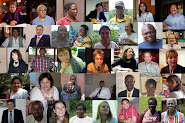
In March 2008 I returned to Sri Lanka where from 2004 – 2005 I worked with the National Council of YMCAs to design and deliver various leadership programs. During that first trip, the Indian Ocean tsunami rushed ashore and as a result, several of the young adults I was training were tapped into regional leadership positions to assist in the recovery and community rebuilding efforts. Part of the goal for the return trip in March was to explore and better understand the impact that early leadership training had in the face of responding to a crisis. The other focus of my trip was to continue CCL’s Global Voices of Leadership effort of developing and testing leadership content that could become curriculum for our early leadership development effort.
The first leadership program conducted was a one day program that translated some of CCL’s core content: Direction Alignment Commitment (DAC) and Assessment Challenge Support (ACS). Typically used with executives around the world, DAC & ACS was adapted to youth friendly scenarios and examples making it understandable and relevant to this younger audience. Additionally, this day program included CCL’s Active Listening guidebook which was converted into curriculum and used as a piece of the program. While the program went extremely well there were some good lessons learned about better ways to facilitate when content is being translated into another language. Overall, the program was a success and I must say I’m always amazed at how eager Sri Lankan youth are to learn and engage. To me it speaks to how much they are craving these types of developmental opportunities.
As is often the case when I’ve traveled as a leadership trainer, people often spring requests on me, could you run an impromptu program for a group of about twenty youth? It’s why we’re here, is usually my response because to deny these young people an opportunity to grow towards their potential just doesn’t feel right. As a result I found myself working with my wife and two of her fellow public health graduate students conducting a last second program that combined the YMCA’s motto of spirit, mind and body with leadership for life. The combination proved potent with one young Sri Lankan sharing, “I think it’s very useful to my future life so I think now I’m a perfect person.” Since sharing this statement around CCL one colleague said, “Perfecting people in 3 hours! Awesome.”
While every portion of this trip to Sri Lanka proved to be powerful perhaps the biggest surprise was in reconnecting with those young professionals whom I trained prior to the tsunami and hearing about the impact those early trainings had on them. As I listened and collected stories and experiences about the tsunami, it became increasingly clear that each of the four young professionals “tapped” into leadership positions, cited their early leadership training as important in helping them fill their role, connect and collaborate with everyone from local community members to the multiple different organizations, agencies and individuals who came in from all over the world. Such a unanimous response pointing to parts of their leadership training was indeed quite a surprise and nearly everyone interviewed discussed the importance of developing future leadership at the grassroots level.
In talking about the impact of leadership training with many different people in Sri Lanka, I often asked the question, what role would leadership training have on youth around the country? Many responded with similar answers such as “youth need this” or it would be the “best thing” in the midst of their situation.
It’s stories of impact and hope such as these that we at CCL continue to hear about around the world and that drive us to ask, what would the world look like if more or even all youth could have access to leadership opportunities? Perhaps we let one Sri Lankan youth answer this for us, “it would enable youth to work on improving all aspects of our society.”



















